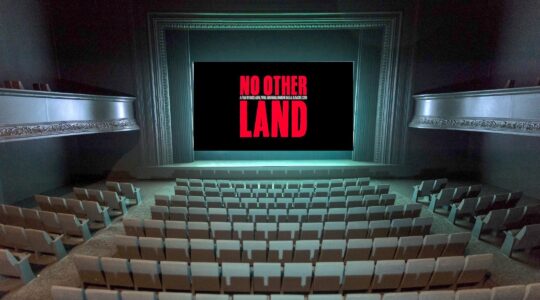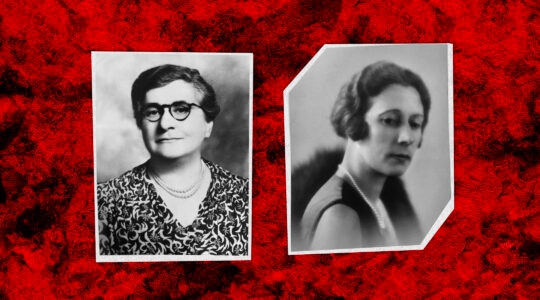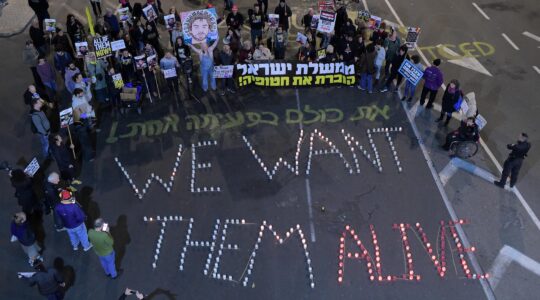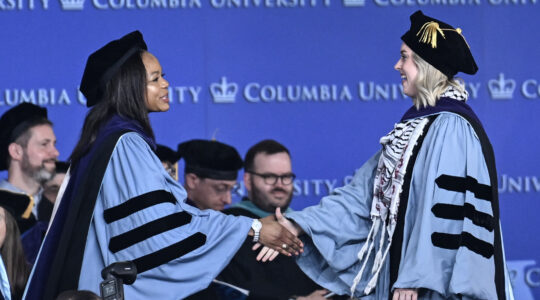The Orthodox Union, the influential national body that serves hundreds of synagogues around the country, finds itself in a bind on an extremely delicate issue that touches on Jewish law and tradition, as well as societal norms in America — the role of women in synagogue life.
But it’s a bind the group put itself in, when, last winter, its leadership decided to produce a statement on the subject, most notably, over women serving, in effect, as rabbis or assistant rabbis, whatever their actual title.
If a designated panel of seven prominent rabbis, not known for leniency on this issue, calls for member synagogues to ban women from the clergy or face expulsion from the organization, will congregations accept the edict, or might they walk away from the OU? And if the statement allows for clerical roles for women, will those on the right of the movement insist that the slippery slope will lead to violating halacha, and bolt?
The findings of the rabbis, and subsequent discussions by the OU board, are, most likely, still weeks, if not months, away. But as those close to the process acknowledge, there are serious worries on both sides of the gender divide about the outcome and its implications.
“The real anxiety is about what all this means for the future of Orthodoxy,” one rabbi close to the process told me this week. He, like most interviewed here, asked not to be named because of the sensitivity of the issue.
As Glass Ceilings Crack
It is not without irony that at a moment in American history when a woman may well be elected to the highest office in the land — one of the last hurdles for full equality in this country — the burning issue in the Orthodox community is one of gender divisions.
When friends and family sit around the Shabbat table these days in Orthodox circles, they are more likely to be discussing if, where and how women fit into Jewish ritual service than, say, the pros and cons of Muslim dialogue in The Age of Trump, or the need to focus on Jewish ethics when scandals in the community seem disturbingly common.
The current issue of Tradition: A Journal of Orthodox Jewish Thought, published by the Rabbinical Council of America (RCA), the largest group of Orthodox rabbis in the U.S., is almost completely devoted to the role of women in religious life, with six articles on the subject, five of which are by men.
A recent graduation at Yeshivat Maharat, which ordains women spiritual leaders. Courtesy OF Yeshivat Maharat
Whatever the reason why, gender roles — including women leading portions of the Shabbat service in partnership minyanim [religious services that seek to maximize female participation within halacha, or Jewish law] — have become the dividing line between what is acceptable and unacceptable within Orthodox parameters. And the stakes are getting higher.
Just this past week, a group of 11 alumni of Yeshivat Chovevei Torah, seeking to distance themselves from a handful of fellow alumni of the “Open Orthodox” rabbinical school, signed on to a statement proclaiming their commitment to Torah miSinai [the Divine authorship of the Torah] and their opposition to partnership minyanim.
Giving equal weight to the two issues seems absurd. One addresses the core belief of Orthodox Judaism and the other counters a liberal interpretation of Jewish law regarding women’s participation in ritual. But the public statement indicated a response to the real fear some liberal Orthodox rabbis have of being marginalized out of the movement altogether.
At the same time, rabbis and others on the Orthodox right are themselves fearful; in their case they worry that the community is loosening its respect for the authority of mesorah — Torah tradition. So that even if, as many halachic experts would acknowledge, there is no direct prohibition against women serving as rabbis, the strong mesorah of a men-only clergy should prevail.
‘Should We Hire
A Woman?’
The fact that there are even discussions about female Orthodox rabbis is a result of the dramatic and widespread increase of serious Torah and Talmud study programs available for women in recent years. In time, various forms of clerical and/or educational positions have opened up for graduates in a small but growing number of synagogues. And while public debate has focused on titles — rabbi, rabbah, maharat, etc. — the reality is that congregants have begun to recognize that the talent pool of learned and skilled women is growing.
“Is it halachically permissible to have a woman rabbi?” some worshippers ask. “Would we — should we — hire one?”
Last fall, in response to such queries, the RCA issued a resolution banning the ordination and hiring of women rabbis. The decision offended many, who accused the rabbis of sexism and/or protecting their all-male turf, especially because two similar declarations had already been made by the RCA in the last few years. But it pleased those who felt the leaders of the movement needed to take a firm stand in favor of longstanding tradition in light of the establishment in 2010 of Yeshivat Maharat, an institution in Riverdale that ordains women.
Almost immediately after the latest RCA statement on women in the clergy, the OU came under pressure from rabbis and synagogue leaders on the right to establish their own position on the subject.
Its process began last winter with the formation of a small working group of six OU lay leaders (including one woman), who in turn chose the seven poskim (rabbinic decisors). (See sidebar.)
The working group invited about 60 people who are active in Orthodox life, including pulpit rabbis, educators and community leaders, to meet with the rabbis so they could “hear directly the range of issues and concerns on the subjects before them that exist within our community,” according to an OU statement.
In a series of sessions held the week of July 5 at Yeshiva University, small groups of invited guests met with two or three of the rabbis at a time.
About 40 invitees participated. The point was not to debate halacha, the OU statement said, but for the rabbis to hear multiple points of view.
‘Talking To Themselves’
Bat Sheva Marcus, president of JOFA (Jewish Orthodox Feminist Alliance), was not invited to participate. “There were a token number of women invited,” she said, none from JOFA and with little if any representation from “the more open” branch of Orthodoxy. “In effect, they were talking to themselves.”
The whole process of establishing “a line in the sand” over women’s rights “seems painful and unnecessary,” according to Marcus, who noted that the OU “does not have such high-level discussions and input on issues like prenuptial agreements, which can save agunot, or preventing sexual abuse or responding to the needs of the disabled.”
But she said the good news was that the rabbis, in agreeing to meet with community representatives, “were acknowledging that their position might be swayed depending on community needs.” That, she said, was proof that such decisions are less about halacha than societal norms.
Michelle Friedman, an Orthodox psychiatrist who directs pastoral counseling at Yeshivat Chovevei Torah, was invited to address the rabbis. She said they were “polite and gracious and appeared to be listening carefully, but it was hard to know what their frame of reference was across the divide.”
“Orthodox women today pursue top-notch professions in every field imaginable. Except for one,” she wrote in a brief essay submitted to the rabbis. (Each guest was invited to do so.)
Denying women full participation in professional religious leadership “deprives our community of desperately needed talent” and “gnaws at the conscience of many younger observant Jews,” she wrote. She added that some are “turned off by the cognitive and emotional dissonance they experience” at women’s exclusion from religious leadership roles.
Several women who head Orthodox high schools for girls stressed a similar point in their meeting with the rabbis, one participant said. The deeply committed women expressed concern about the shortage of talented female teachers of limudei kodesh [religious studies]. And they said that after a young woman’s seminary years, often post-high school in Israel, or during college, there is a serious spiritual void in their lives in terms of prayer and Torah study.
One rabbi with close ties to mainstream Orthodox institutions went further in his assessment.
“The real issue the OU should be exploring is why so many men and women in our community feel disenfranchised on a deep level,” he told me. He said the OU effort to produce a statement on women’s roles in the clergy was misguided on two levels. “I object in principle because it is wrong to deny women leadership roles. And politically and practically, the OU chose to pick a fight it is going to lose.”
He noted that women’s professional roles in the clergy are a fact of life today and should be encouraged, not denigrated, pointing out that in Israel’s Modern Orthodox circles, women are taking on such roles with virtually no pushback.
‘The Great Flash Point’
What happens now?
It seems clear that the OU was pressed by several prominent rabbinic leaders to take on this issue, and several of the group’s lay leaders acknowledge they are very worried about a deepening rift that could result from the outcome unless it is handled with great sensitivity. They note that even if, as many expect, the rabbinic committee produces a negative statement on women serving in the clergy, the OU’s executive committee and board has the opportunity to place it in the context of their own report.
Michelle Friedman, the psychiatrist, says decisions about gender roles in Orthodox life are “the great flash point” of the moment because they speak to “fear of change” within a religious framework steeped in tradition.
While OU officials emphasize that they are “in the middle of the process and nothing has happened yet,” the fact is that there is much curiosity, worry and debate already taking place within the community about the organization’s months-long efforts. And, however it plays out, the issue of women’s involvement in Orthodox life in terms of prayer, study and clerical roles will remain a contentious topic. That is a certainty as long as there is a distinct difference between women’s religious participation and how they live the rest of their lives in a modern society.
Gary@jewishweek.org
An OU Who’s Who
The small working group appointed by Orthodox Union (OU) president Martin Nachimson to come up with “a proposed statement, and guidance to member synagogues, with regard to the ordination of women, and related issues,” according to an OU statement, includes:
Moshe Bane, chair of the OU board of governors; Harvey Blitz, a former OU president; Allen Fagin, OU executive vice president; Marian Stoltz-Loike, a vice president of Touro College and dean of Lander College for Women; Michael Wimpfeimer, a senior vice president of the OU; and Nachimson, who lives in Los Angeles; the other members are from New York.
The working group chose the following rabbis to serve in the role of poskim, or religious decisors, “to provide halachic and haskafic [worldview] guidance”:
Rabbi Daniel Feldman, rosh yeshiva, Yeshiva University; Rabbi Yaakov Neuburger, rosh yeshiva, Yeshiva University, and spiritual leader of Congregation Beth Abraham, Bergenfield, N.J.; Rabbi Michael Rosensweig, rosh yeshiva, Yeshiva University; Rabbi Herschel Schachter, rosh yeshiva, Yeshiva University; Rabbi Gedalia Schwartz, head of the rabbinical court of the Beth Din of America, based in Chicago; Rabbi Ezra Schwartz, rosh yeshiva, Yeshiva University, and spiritual leader, Mount Sinai Jewish Center, Washington Heights; and Rabbi Benjamin Yudin, spiritual leader, Congregation Shomrei Torah, Fairlawn, N.J.
OU officials privately acknowledge that the composition of the panel indicates a tilt to the right on women’s issues, but note that three of the members hold pulpit positions, suggesting a sensitivity to congregants’ concerns.
Insiders note that though Rabbi Schachter has made a number of statements over the years perceived as offensive to women, the rabbi on the panel driving the effort to produce a statement critical of women’s roles in the clergy is Michael Rosensweig.
The New York Jewish Week brings you the stories behind the headlines, keeping you connected to Jewish life in New York. Help sustain the reporting you trust by donating today.





